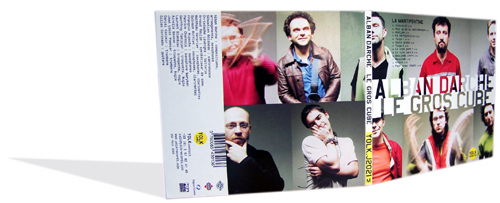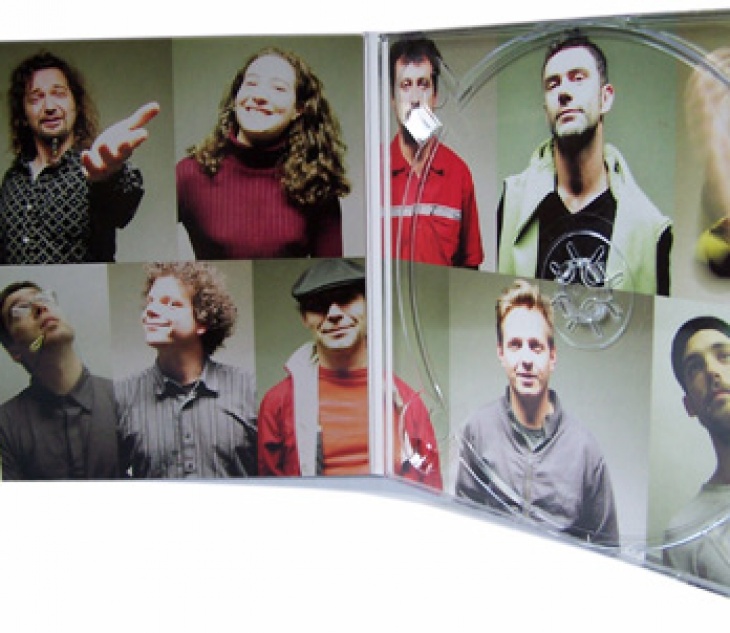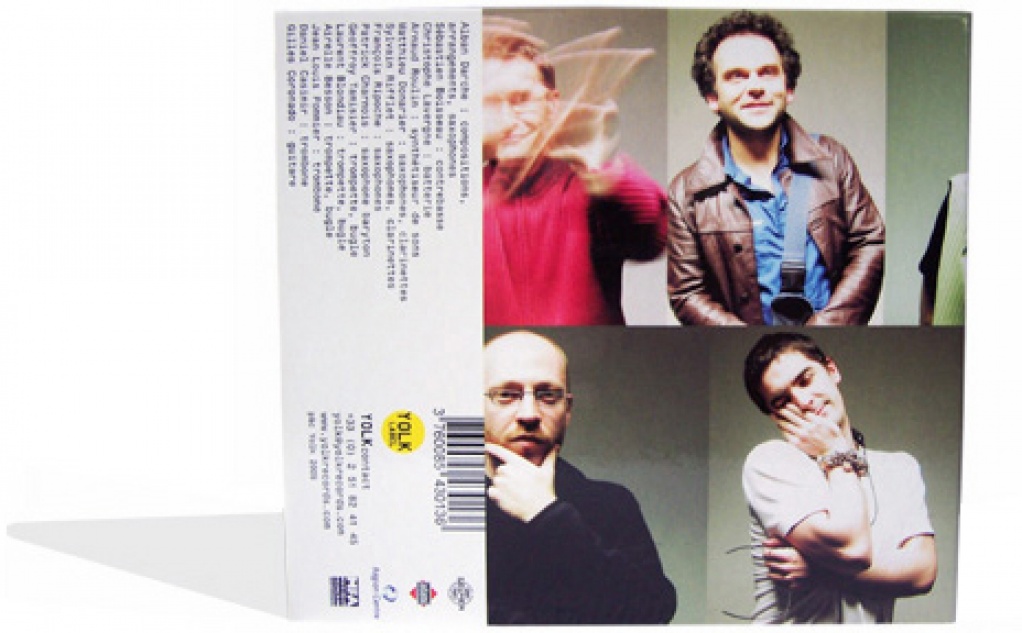reference number : J2021
release date : 10/06/2004
release date : 10/06/2004
about this album
Jazz is a type of popular music.
Le Gros Cube by Alban Darch is good news for jazz. Good news for the history of French jazz. Put like that, obviously, it seems an exaggeration. But let’s get one thing straight: Le Gros Cube by Alban Darche doesn’t pretend to change the history of jazz. It is a landmark. The music played for Le Gros Cube quite simply could not have been written or played before now.
Alban Darche is under thirty years old. Most of his fellow musicians are of the same age. They were trained and played – and still play – with the great movers and shakers of “classical” jazz. Musicians like Bruno Chevillon, Daniel Humair, Marc Ducret, Steve Coleman, Tim Berne, Claude Barthélémy... They came after this generation of musicians who, to dethrone idols, sometimes radicalised their music. Everything that might bear the slightest resemblance to the terrible relationship of jazz with American dance music has been cut out. The operation was successful: it gave rise to a freedom and a creativity rarely achieved until then. It also had the side-effect of “intellectualising” jazz, making it complex, and finally distancing it from the larger public.
Alban Darche and the musicians of Le Gros Cube come after that generation. They have no statues to unseat, no idols to burn. And between them they have so many conservatoire prizes that they no longer need to add any more to prove their mastery in theory and technique. They have won the right to play what they love. They are among those groups that follow their elders’ committed research.
At the same time, when they feel like rediscovering the simple joy of a “big band” that swings and roars with style, they throw themselves right in without reservation. That’s what Le Gros Cube is: pleasure to the first degree. A shared pleasure. On the stage with the musicians. In the hall, with the public, all publics. Casual listeners will find here all that brings a smile to the lips when listening to the big bands of American jazz. At the same time, “informed” lovers of jazz will be impressed by the richness of the orchestrations, the perfection of the ensemble sound, and keen creativity of the soloists.
And if, in touching at once the lowbrow and specialists, Le Gros Cube were to rediscover the very essence of jazz? And if, finally, jazz had no other justification than to be popular music played by learned musicians?
Le Gros Cube by Alban Darch is good news for jazz. Good news for the history of French jazz. Put like that, obviously, it seems an exaggeration. But let’s get one thing straight: Le Gros Cube by Alban Darche doesn’t pretend to change the history of jazz. It is a landmark. The music played for Le Gros Cube quite simply could not have been written or played before now.
Alban Darche is under thirty years old. Most of his fellow musicians are of the same age. They were trained and played – and still play – with the great movers and shakers of “classical” jazz. Musicians like Bruno Chevillon, Daniel Humair, Marc Ducret, Steve Coleman, Tim Berne, Claude Barthélémy... They came after this generation of musicians who, to dethrone idols, sometimes radicalised their music. Everything that might bear the slightest resemblance to the terrible relationship of jazz with American dance music has been cut out. The operation was successful: it gave rise to a freedom and a creativity rarely achieved until then. It also had the side-effect of “intellectualising” jazz, making it complex, and finally distancing it from the larger public.
Alban Darche and the musicians of Le Gros Cube come after that generation. They have no statues to unseat, no idols to burn. And between them they have so many conservatoire prizes that they no longer need to add any more to prove their mastery in theory and technique. They have won the right to play what they love. They are among those groups that follow their elders’ committed research.
At the same time, when they feel like rediscovering the simple joy of a “big band” that swings and roars with style, they throw themselves right in without reservation. That’s what Le Gros Cube is: pleasure to the first degree. A shared pleasure. On the stage with the musicians. In the hall, with the public, all publics. Casual listeners will find here all that brings a smile to the lips when listening to the big bands of American jazz. At the same time, “informed” lovers of jazz will be impressed by the richness of the orchestrations, the perfection of the ensemble sound, and keen creativity of the soloists.
And if, in touching at once the lowbrow and specialists, Le Gros Cube were to rediscover the very essence of jazz? And if, finally, jazz had no other justification than to be popular music played by learned musicians?
tracklist
01. Indicatif
02. Hold-up de la saltimbanque
03. Amalgam
04. La martipontine
05. Tango 1
06. Suite arabe
07. Tango 2
08. Le cube part 1
09. Le cube part 2
10. Basilade intro
11. Basilade
12. Krabut
13. Papa tango stephi
02. Hold-up de la saltimbanque
03. Amalgam
04. La martipontine
05. Tango 1
06. Suite arabe
07. Tango 2
08. Le cube part 1
09. Le cube part 2
10. Basilade intro
11. Basilade
12. Krabut
13. Papa tango stephi
Connexions
other works with Alban Darche
Le Cube >> Le ThéLe Gros Cube >> LE PAX, Le Gros Cube VS Katerine
Le Gros Cube >> Polar mood
Le Cube >> Autorité Culinaire
Quartethno >> quartethno
OLH Acoustic >> une vie sans lune
Jazzophone quartet >> blues for geo
Jazzophone cie + Tim Berne >> mosaiques
Qüntêt >> on the road enfin...
OLH Acoustic >> G. meets K.
Jazzophone >> yellow suite
Alban Darche trio >> trickster
Qüntêt >> vents dominants
Alban Darche trio >> brut ou demi sec?
D. Casimir & Yolk en cuisine >> Phonotaxis ou le génome de la vache
Quartethno >> tawada
Le Cube >> Frelon Rouge
Le Gros Cube >> Queen bishop
JASS >> JASS
Orphicube >> perception instantanée
Le Gros Cube #2 >> Histoire sans paroles
Alban Darche hyprcub >> Crooked House
Qüntêt featuring Desdamona >> Mots croisés/ Crosswords
JASS >> mix of sun and clouds
Orphicube >> Atomic Flonflons
Jean-Christophe Cholet - Alban Darche - Mathias Ruëgg >> Le tombeau de Poulenc
Clover >> Vert Emeraude
PACIFIC >> PACIFIC
Longboard >> Being wild
Le Gros Cube #2 >>
Clover >> Paradigme
Alban Darche & Dandy Dandie >> Hypnos & Morphée
Alban Darche et Loïs Le Van >> Les mots bleus
Alban Darche et Loïs Le Van >> Lazy Afternoon
Clover >> Magellan
Alban Darche & Dandy Dandie >> Helios y Selene
other works with Airelle Besson
Le Gros Cube >> LE PAX, Le Gros Cube VS KaterineA suivre... x'tet >> paris-calvance
A suivre... x'tet >> variations alterees
other works with Laurent Blondiau
UNIT >> wavin'Le Gros Cube >> LE PAX, Le Gros Cube VS Katerine
Le Gros Cube >> Polar mood
Octurn >> 21 emanations
Print & friends >> around k
David Chevallier quartet >> Curiosity
other works with Sébastien Boisseau
UNIT >> wavin'Le Cube >> Le Thé
Le Gros Cube >> LE PAX, Le Gros Cube VS Katerine
Le Gros Cube >> Polar mood
Le Cube >> Autorité Culinaire
Triade >> japan edition
Triade >> l'ardu
A suivre... x'tet >> paris-calvance
A suivre... x'tet >> variations alterees
Hazebrouck sextet >> frasques
D. Casimir & Yolk en cuisine >> Phonotaxis ou le génome de la vache
Le Cube >> Frelon Rouge
Wood (boisseau-donarier) >> WOOD
Le Gros Cube >> Queen bishop
JASS >> JASS
Orphicube >> perception instantanée
Alban Darche hyprcub >> Crooked House
La Musique de Salon >> 1 salon, 2 musiciens
JASS >> mix of sun and clouds
Orphicube >> Atomic Flonflons
Orbit >> Orbit
Clover >> Vert Emeraude
Le Gros Cube #2 >>
Clover >> Paradigme
Le Gros Cube #2 >> Histoire sans paroles
David Chevallier quartet >> Curiosity
Orbit >> In-visibility
Jean-Paul Delore, Louis Sclavis, Sébastien Boisseau >> Langues et lueurs
Clover >> Magellan
David Chevallier trio >> ReSet
other works with Daniel Casimir
Le Gros Cube >> LE PAX, Le Gros Cube VS KaterineLe Gros Cube >> Polar mood
Daniel Casimir >> eros et thanatos
ETVBT >> wunschklang
D. Casimir & Yolk en cuisine >> Phonotaxis ou le génome de la vache
Le Gros Cube >> Queen bishop
other works with Patrick Charnois
Le Cube >> Le ThéLe Gros Cube >> LE PAX, Le Gros Cube VS Katerine
Le Gros Cube >> Polar mood
Jazzophone quartet >> blues for geo
Jazzophone cie + Tim Berne >> mosaiques
Jazzophone >> yellow suite
Qüntêt >> vents dominants
Quartethno >> tawada
other works with Matthieu Donarier
Matthieu Donarier trio >> live formsUNIT >> wavin'
Le Gros Cube >> LE PAX, Le Gros Cube VS Katerine
Le Gros Cube >> Polar mood
Matthieu Donarier trio >> optic topic
Kindergarten >> kindergarten
D. Casimir & Yolk en cuisine >> Phonotaxis ou le génome de la vache
Wood (boisseau-donarier) >> WOOD
Le Gros Cube >> Queen bishop
Orphicube >> perception instantanée
Matthieu Donarier trio >> Papier Jungle
Jean-Christophe Cholet - Alban Darche - Mathias Ruëgg >> Le tombeau de Poulenc
Adieu mes très belles >> Adieu mes très belles
Longboard >> Being wild
Santi Quintans' TIPTRICK >> Kiss the Joy
Le Gros Cube #2 >>
Le Gros Cube #2 >> Histoire sans paroles
Matthieu Donarier quartet >> COASTLINE
other works with Christophe Lavergne
Le Cube >> Le ThéLe Gros Cube >> LE PAX, Le Gros Cube VS Katerine
Le Gros Cube >> Polar mood
Le Cube >> Autorité Culinaire
Francis et ses peintres >> la paloma
Qüntêt >> vents dominants
LPT3 >> deja 7h!?...
Le Cube >> Frelon Rouge
Le Gros Cube >> Queen bishop
Orphicube >> perception instantanée
Alban Darche hyprcub >> Crooked House
Jazzarium >> Megapolis
Qüntêt featuring Desdamona >> Mots croisés/ Crosswords
LPT3 >> Vents Divers
Orphicube >> Atomic Flonflons
Jean-Christophe Cholet - Alban Darche - Mathias Ruëgg >> Le tombeau de Poulenc
Le Gros Cube #2 >>
Le Gros Cube #2 >> Histoire sans paroles
David Chevallier quartet >> Curiosity
Louis Sclavis quintet >> INDIA
David Chevallier trio >> ReSet
other works with Jean-Louis Pommier
Le Gros Cube >> LE PAX, Le Gros Cube VS KaterineLe Gros Cube >> Polar mood
Qüntêt >> on the road enfin...
A suivre... x'tet >> paris-calvance
Le souffle des terroirs >>
A suivre... x'tet >> variations alterees
Qüntêt >> vents dominants
LPT3 >> deja 7h!?...
D. Casimir & Yolk en cuisine >> Phonotaxis ou le génome de la vache
A suivre... x'tet >> suite... de danses
Le Gros Cube >> Queen bishop
Brass danse orchestra >> La danse du souffle
Jazzarium >> Megapolis
Qüntêt featuring Desdamona >> Mots croisés/ Crosswords
LPT3 >> Vents Divers
Clover >> Vert Emeraude
Yves Rousseau 7tet - >> Fragments
Santi Quintans' TIPTRICK >> Kiss the Joy
Le Gros Cube #2 >>
Clover >> Paradigme
Le Gros Cube #2 >> Histoire sans paroles
Brass danse orchestra >> La danse du temps
Clover >> Magellan
Alban Darche & Dandy Dandie >> Helios y Selene
other works with Sylvain Rifflet
Le Gros Cube >> LE PAX, Le Gros Cube VS KaterineLe Gros Cube >> Polar mood
A suivre... x'tet >> paris-calvance
A suivre... x'tet >> variations alterees
Jazzophone >> yellow suite
ETVBT >> wunschklang
Le Gros Cube >> Queen bishop
Orphicube >> perception instantanée
Alban Darche et Loïs Le Van >> Les mots bleus
Alban Darche et Loïs Le Van >> Lazy Afternoon
other works with François Ripoche
Le Gros Cube >> LE PAX, Le Gros Cube VS KaterineLe Gros Cube >> Polar mood
Francis et ses peintres >> la paloma
Le souffle des terroirs >>
Out of the blue >> urban setting
Le Gros Cube >> Queen bishop
Orphicube >> perception instantanée
other works with Arnaud Roulin
Le Cube >> Le ThéLe Gros Cube >> Polar mood
Le Gros Cube >> LE PAX, Le Gros Cube VS Katerine
Le Cube >> Autorité Culinaire
other works with Geoffroy Tamisier
Le Gros Cube >> LE PAX, Le Gros Cube VS KaterineLe Gros Cube >> Polar mood
Le Cube >> Autorité Culinaire
Quartethno >> quartethno
OLH Acoustic >> une vie sans lune
Jazzophone cie + Tim Berne >> mosaiques
OLH Acoustic >> G. meets K.
Le souffle des terroirs >>
Geoffroy Tamisier trio >> au bonheur des anges
Quartethno >> tawada
Georgui Kornazov quintet >> staro vreme
Le Gros Cube >> Queen bishop
Brass danse orchestra >> La danse du souffle
Jazzarium >> Megapolis
PACIFIC >> PACIFIC
Nathalie Darche joue Geoffroy Tamisier >> 15 berceuses
Le Gros Cube #2 >>
Le Gros Cube #2 >> Histoire sans paroles
Alban Darche & Dandy Dandie >> Hypnos & Morphée
Brass danse orchestra >> La danse du temps
Alban Darche & Dandy Dandie >> Helios y Selene


